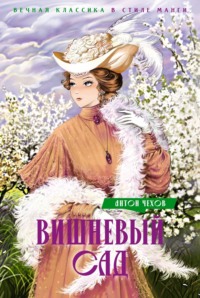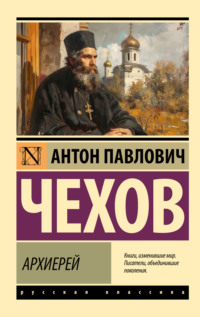 полная версия
полная версияThe Chorus Girl and Other Stories
"'Yes. We breathe in oxygen; now tell me, Petya, what do we breathe out?'
"'Carbonic acid gas,' I answered, looking towards the same window.
"'Right,' assented Zinotchka. 'Plants, on the contrary, breathe in carbonic acid gas, and breathe out oxygen. Carbonic acid gas is contained in seltzer water, and in the fumes from the samovar… It is a very noxious gas. Near Naples there is the so-called Cave of Dogs, which contains carbonic acid gas; a dog dropped into it is suffocated and dies.'
"This luckless Cave of Dogs near Naples is a chemical marvel beyond which no governess ventures to go. Zinotchka always hotly maintained the usefulness of natural science, but I doubt if she knew any chemistry beyond this Cave.
"Well, she told me to repeat it. I repeated it. She asked me what was meant by the horizon. I answered. And meantime, while we were ruminating over the horizon and the Cave, in the yard below, my father was just getting ready to go shooting. The dogs yapped, the trace horses shifted from one leg to another impatiently and coquetted with the coachman, the footman packed the waggonette with parcels and all sorts of things. Beside the waggonette stood a brake in which my mother and sisters were sitting to drive to a name-day party at the Ivanetskys'. No one was left in the house but Zinotchka, me, and my eldest brother, a student, who had toothache. You can imagine my envy and my boredom.
"'Well, what do we breathe in?' asked Zinotchka, looking at the window.
"'Oxygen..'
"'Yes. And the horizon is the name given to the place where it seems to us as though the earth meets the sky.'
"Then the waggonette drove off, and after it the brake… I saw Zinotchka take a note out of her pocket, crumple it up convulsively and press it to her temple, then she flushed crimson and looked at her watch.
"'So, remember,' she said, 'that near Naples is the so-called Cave of Dogs..' She glanced at her watch again and went on: 'where the sky seems to us to meet the earth..'
"The poor girl in violent agitation walked about the room, and once more glanced at her watch. There was another half-hour before the end of our lesson.
"'Now arithmetic,' she said, breathing hard and turning over the pages of the sum-book with a trembling hand. 'Come, you work out problem 325 and I.. will be back directly.'
"She went out. I heard her scurry down the stairs, and then I saw her dart across the yard in her blue dress and vanish through the garden gate. The rapidity of her movements, the flush on her cheeks and her excitement, aroused my curiosity. Where had she run, and what for? Being intelligent beyond my years I soon put two and two together, and understood it all: she had run into the garden, taking advantage of the absence of my stern parents, to steal in among the raspberry bushes, or to pick herself some cherries. If that were so, dash it all, I would go and have some cherries too. I threw aside the sum-book and ran into the garden. I ran to the cherry orchard, but she was not there. Passing by the raspberries, the gooseberries, and the watchman's shanty, she crossed the kitchen garden and reached the pond, pale, and starting at every sound. I stole after her, and what I saw, my friends, was this. At the edge of the pond, between the thick stumps of two old willows, stood my elder brother, Sasha; one could not see from his face that he had toothache. He looked towards Zinotchka as she approached him, and his whole figure was lighted up by an expression of happiness as though by sunshine. And Zinotchka, as though she were being driven into the Cave of Dogs, and were being forced to breathe carbonic acid gas, walked towards him, scarcely able to move one leg before the other, breathing hard, with her head thrown back… To judge from appearances she was going to a rendezous for the first time in her life. But at last she reached him… For half a minute they gazed at each other in silence, as though they could not believe their eyes. Thereupon some force seemed to shove Zinotchka; she laid her hands on Sasha's shoulders and let her head droop upon his waistcoat. Sasha laughed, muttered something incoherent, and with the clumsiness of a man head over ears in love, laid both hands on Zinotchka's face. And the weather, gentlemen, was exquisite… The hill behind which the sun was setting, the two willows, the green bank, the sky – all together with Sasha and Zinotchka were reflected in the pond.. perfect stillness.. you can imagine it. Millions of butterflies with long whiskers gleamed golden above the reeds; beyond the garden they were driving the cattle. In fact, it was a perfect picture.
"Of all I had seen the only thing I understood was that Sasha was kissing Zinotchka. That was improper. If maman heard of it they would both catch it. Feeling for some reason ashamed I went back to the nursery, not waiting for the end of the rendezvous. There I sat over the sum-book, pondered and reflected. A triumphant smile strayed upon my countenance. On one side it was agreeable to be the possessor of another person's secret; on the other it was also very agreeable that such authorities as Sasha and Zinotchka might at any moment be convicted by me of ignorance of the social proprieties. Now they were in my power, and their peace was entirely dependent on my magnanimity. I'd let them know.
"When I went to bed, Zinotchka came into the nursery as usual to find out whether I had dropped asleep without undressing and whether I had said my prayers. I looked at her pretty, happy face and grinned. I was bursting with my secret and itching to let it out. I had to drop a hint and enjoy the effect.
"'I know,' I said, grinning. 'Gy – y.'
"'What do you know?'
"'Gy – y! I saw you near the willows kissing Sasha. I followed you and saw it all.'
"Zinotchka started, flushed all over, and overwhelmed by 'my hint' she sank down on the chair, on which stood a glass of water and a candlestick.
"'I saw you.. kissing.' I repeated, sniggering and enjoying her confusion. 'Aha! I'll tell mamma!'
"Cowardly Zinotchka gazed at me intently, and convincing herself that I really did know all about it, clutched my hand in despair and muttered in a trembling whisper:
"'Petya, it is low… I beg of you, for God's sake… Be a man.. don't tell anyone… Decent people don't spy.. It's low… I entreat you.'
"The poor girl was terribly afraid of my mother, a stern and virtuous lady – that was one thing; and the second was that my grinning countenance could not but outrage her first love so pure and poetical, and you can imagine the state of her heart. Thanks to me, she did not sleep a wink all night, and in the morning she appeared at breakfast with blue rings round her eyes. When I met Sasha after breakfast I could not refrain from grinning and boasting:
"'I know! I saw you yesterday kissing Mademoiselle Zina!'
"Sasha looked at me and said:
"'You are a fool.'
"He was not so cowardly as Zinotchka, and so my effect did not come off. That provoked me to further efforts. If Sasha was not frightened it was evident that he did not believe that I had seen and knew all about it; wait a bit, I would show him.
"At our lessons before dinner Zinotchka did not look at me, and her voice faltered. Instead of trying to scare me she tried to propitiate me in every way, giving me full marks, and not complaining to my father of my naughtiness. Being intelligent beyond my years I exploited her secret: I did not learn my lessons, walked into the schoolroom on my head, and said all sorts of rude things. In fact, if I had remained in that vein till to-day I should have become a famous blackmailer. Well, a week passed. Another person's secret irritated and fretted me like a splinter in my soul. I longed at all costs to blurt it out and gloat over the effect. And one day at dinner, when we had a lot of visitors, I gave a stupid snigger, looked fiendishly at Zinotchka and said:
"'I know. Gy – y! I saw!.'
"'What do you know?' asked my mother.
"I looked still more fiendishly at Zinotchka and Sasha. You ought to have seen how the girl flushed up, and how furious Sasha's eyes were! I bit my tongue and did not go on. Zinotchka gradually turned pale, clenched her teeth, and ate no more dinner. At our evening lessons that day I noticed a striking change in Zinotchka's face. It looked sterner, colder, as it were, more like marble, while her eyes gazed strangely straight into my face, and I give you my word of honour I have never seen such terrible, annihilating eyes, even in hounds when they overtake the wolf. I understood their expression perfectly, when in the middle of a lesson she suddenly clenched her teeth and hissed through them:
"'I hate you! Oh, you vile, loathsome creature, if you knew how I hate you, how I detest your cropped head, your vulgar, prominent ears!'
"But at once she took fright and said:
"'I am not speaking to you, I am repeating a part out of a play..'
"Then, my friends, at night I saw her come to my bedside and gaze a long time into my face. She hated me passionately, and could not exist away from me. The contemplation of my hated pug of a face had become a necessity to her. I remember a lovely summer evening.. with the scent of hay, perfect stillness, and so on. The moon was shining. I was walking up and down the avenue, thinking of cherry jam. Suddenly Zinotchka, looking pale and lovely, came up to me, she caught hold of my hand, and breathlessly began expressing herself:
"'Oh, how I hate you! I wish no one harm as I do you! Let me tell you that! I want you to understand that!'
"You understand, moonlight, her pale face, breathless with passion, the stillness.. little pig as I was I actually enjoyed it. I listened to her, looked at her eyes… At first I liked it, and enjoyed the novelty. Then I was suddenly seized with terror, I gave a scream, and ran into the house at breakneck speed.
"I made up my mind that the best thing to do was to complain to maman. And I did complain, mentioning incidentally how Sasha had kissed Zinotchka. I was stupid, and did not know what would follow, or I should have kept the secret to myself… After hearing my story maman flushed with indignation and said:
"'It is not your business to speak about that, you are still very young… But, what an example for children.'
"My maman was not only virtuous but diplomatic. To avoid a scandal she did not get rid of Zinotchka at once, but set to work gradually, systematically, to pave the way for her departure, as one does with well-bred but intolerable people. I remember that when Zinotchka did leave us the last glance she cast at the house was directed at the window at which I was sitting, and I assure you, I remember that glance to this day.
"Zinotchka soon afterwards became my brother's wife. She is the Zinaida Nikolaevna whom you know. The next time I met her I was already an ensign. In spite of all her efforts she could not recognize the hated Petya in the ensign with his moustache, but still she did not treat me quite like a relation… And even now, in spite of my good-humoured baldness, meek corpulence, and unassuming air, she still looks askance at me, and feels put out when I go to see my brother. Hatred it seems can no more be forgotten than love..
"Tchoo! I hear the cock crowing! Good-night. Milord! Lie down!"
BAD WEATHER
BIG raindrops were pattering on the dark windows. It was one of those disgusting summer holiday rains which, when they have begun, last a long time – for weeks, till the frozen holiday maker grows used to it, and sinks into complete apathy. It was cold; there was a feeling of raw, unpleasant dampness. The mother-in-law of a lawyer, called Kvashin, and his wife, Nadyezhda Filippovna, dressed in waterproofs and shawls, were sitting over the dinner table in the dining-room. It was written on the countenance of the elder lady that she was, thank God, well-fed, well-clothed and in good health, that she had married her only daughter to a good man, and now could play her game of patience with an easy conscience; her daughter, a rather short, plump, fair young woman of twenty, with a gentle anæmic face, was reading a book with her elbows on the table; judging from her eyes she was not so much reading as thinking her own thoughts, which were not in the book. Neither of them spoke. There was the sound of the pattering rain, and from the kitchen they could hear the prolonged yawns of the cook.
Kvashin himself was not at home. On rainy days he did not come to the summer villa, but stayed in town; damp, rainy weather affected his bronchitis and prevented him from working. He was of the opinion that the sight of the grey sky and the tears of rain on the windows deprived one of energy and induced the spleen. In the town, where there was greater comfort, bad weather was scarcely noticed.
After two games of patience, the old lady shuffled the cards and took a glance at her daughter.
"I have been trying with the cards whether it will be fine to-morrow, and whether our Alexey Stepanovitch will come," she said. "It is five days since he was here… The weather is a chastisement from God."
Nadyezhda Filippovna looked indifferently at her mother, got up, and began walking up and down the room.
"The barometer was rising yesterday," she said doubtfully, "but they say it is falling again to-day."
The old lady laid out the cards in three long rows and shook her head.
"Do you miss him?" she asked, glancing at her daughter.
"Of course."
"I see you do. I should think so. He hasn't been here for five days. In May the utmost was two, or at most three days, and now it is serious, five days! I am not his wife, and yet I miss him. And yesterday, when I heard the barometer was rising, I ordered them to kill a chicken and prepare a carp for Alexey Stepanovitch. He likes them. Your poor father couldn't bear fish, but he likes it. He always eats it with relish."
"My heart aches for him," said the daughter. "We are dull, but it is duller still for him, you know, mamma."
"I should think so! In the law-courts day in and day out, and in the empty flat at night alone like an owl."
"And what is so awful, mamma, he is alone there without servants; there is no one to set the samovar or bring him water. Why didn't he engage a valet for the summer months? And what use is the summer villa at all if he does not care for it? I told him there was no need to have it, but no, 'It is for the sake of your health,' he said, and what is wrong with my health? It makes me ill that he should have to put up with so much on my account."
Looking over her mother's shoulder, the daughter noticed a mistake in the patience, bent down to the table and began correcting it. A silence followed. Both looked at the cards and imagined how their Alexey Stepanovitch, utterly forlorn, was sitting now in the town in his gloomy, empty study and working, hungry, exhausted, yearning for his family..
"Do you know what, mamma?" said Nadyezhda Filippovna suddenly, and her eyes began to shine. "If the weather is the same to-morrow I'll go by the first train and see him in town! Anyway, I shall find out how he is, have a look at him, and pour out his tea."
And both of them began to wonder how it was that this idea, so simple and easy to carry out, had not occurred to them before. It was only half an hour in the train to the town, and then twenty minutes in a cab. They said a little more, and went off to bed in the same room, feeling more contented.
"Oho-ho-ho… Lord, forgive us sinners!" sighed the old lady when the clock in the hall struck two. "There is no sleeping."
"You are not asleep, mamma?" the daughter asked in a whisper. "I keep thinking of Alyosha. I only hope he won't ruin his health in town. Goodness knows where he dines and lunches. In restaurants and taverns."
"I have thought of that myself," sighed the old lady. "The Heavenly
Mother save and preserve him. But the rain, the rain!"
In the morning the rain was not pattering on the panes, but the sky was still grey. The trees stood looking mournful, and at every gust of wind they scattered drops. The footprints on the muddy path, the ditches and the ruts were full of water. Nadyezhda Filippovna made up her mind to go.
"Give him my love," said the old lady, wrapping her daughter up. "Tell him not to think too much about his cases… And he must rest. Let him wrap his throat up when he goes out: the weather – God help us! And take him the chicken; food from home, even if cold, is better than at a restaurant."
The daughter went away, saying that she would come back by an evening train or else next morning.
But she came back long before dinner-time, when the old lady was sitting on her trunk in her bedroom and drowsily thinking what to cook for her son-in-law's supper.
Going into the room her daughter, pale and agitated, sank on the bed without uttering a word or taking off her hat, and pressed her head into the pillow.
"But what is the matter," said the old lady in surprise, "why back so soon? Where is Alexey Stepanovitch?"
Nadyezhda Filippovna raised her head and gazed at her mother with dry, imploring eyes.
"He is deceiving us, mamma," she said.
"What are you saying? Christ be with you!" cried the old lady in alarm, and her cap slipped off her head. "Who is going to deceive us? Lord, have mercy on us!"
"He is deceiving us, mamma!" repeated her daughter, and her chin began to quiver.
"How do you know?" cried the old lady, turning pale.
"Our flat is locked up. The porter tells me that Alyosha has not been home once for these five days. He is not living at home! He is not at home, not at home!"
She waved her hands and burst into loud weeping, uttering nothing but: "Not at home! Not at home!"
She began to be hysterical.
"What's the meaning of it?" muttered the old woman in horror. "Why, he wrote the day before yesterday that he never leaves the flat! Where is he sleeping? Holy Saints!"
Nadyezhda Filippovna felt so faint that she could not take off her hat. She looked about her blankly, as though she had been drugged, and convulsively clutched at her mother's arms.
"What a person to trust: a porter!" said the old lady, fussing round her daughter and crying. "What a jealous girl you are! He is not going to deceive you, and how dare he? We are not just anybody. Though we are of the merchant class, yet he has no right, for you are his lawful wife! We can take proceedings! I gave twenty thousand roubles with you! You did not want for a dowry!"
And the old lady herself sobbed and gesticulated, and she felt faint, too, and lay down on her trunk. Neither of them noticed that patches of blue had made their appearance in the sky, that the clouds were more transparent, that the first sunbeam was cautiously gliding over the wet grass in the garden, that with renewed gaiety the sparrows were hopping about the puddles which reflected the racing clouds.
Towards evening Kvashin arrived. Before leaving town he had gone to his flat and had learned from the porter that his wife had come in his absence.
"Here I am," he said gaily, coming into his mother-in-law's room and pretending not to notice their stern and tear-stained faces. "Here I am! It's five days since we have seen each other!"
He rapidly kissed his wife's hand and his mother-in-law's, and with the air of man delighted at having finished a difficult task, he lolled in an arm-chair.
"Ough!" he said, puffing out all the air from his lungs. "Here I have been worried to death. I have scarcely sat down. For almost five days now I have been, as it were, bivouacking. I haven't been to the flat once, would you believe it? I have been busy the whole time with the meeting of Shipunov's and Ivantchikov's creditors; I had to work in Galdeyev's office at the shop… I've had nothing to eat or to drink, and slept on a bench, I was chilled through.. I hadn't a free minute. I hadn't even time to go to the flat. That's how I came not to be at home, Nadyusha,. And Kvashin, holding his sides as though his back were aching, glanced stealthily at his wife and mother-in-law to see the effect of his lie, or as he called it, diplomacy. The mother-in-law and wife were looking at each other in joyful astonishment, as though beyond all hope and expectation they had found something precious, which they had lost… Their faces beamed, their eyes glowed..
"My dear man," cried the old lady, jumping up, "why am I sitting here? Tea! Tea at once! Perhaps you are hungry?"
"Of course he is hungry," cried his wife, pulling off her head a bandage soaked in vinegar. "Mamma, bring the wine, and the savouries. Natalya, lay the table! Oh, my goodness, nothing is ready!"
And both of them, frightened, happy, and bustling, ran about the room. The old lady could not look without laughing at her daughter who had slandered an innocent man, and the daughter felt ashamed..
The table was soon laid. Kvashin, who smelt of madeira and liqueurs and who could scarcely breathe from repletion, complained of being hungry, forced himself to munch and kept on talking of the meeting of Shipunov's and Ivantchikov's creditors, while his wife and mother-in-law could not take their eyes off his face, and both thought:
"How clever and kind he is! How handsome!"
"All serene," thought Kvashin, as he lay down on the well-filled feather bed. "Though they are regular tradesmen's wives, though they are Philistines, yet they have a charm of their own, and one can spend a day or two of the week here with enjoyment.."
He wrapped himself up, got warm, and as he dozed off, he said to himself:
"All serene!"
A GENTLEMAN FRIEND
THE charming Vanda, or, as she was described in her passport, the "Honourable Citizen Nastasya Kanavkin," found herself, on leaving the hospital, in a position she had never been in before: without a home to go to or a farthing in her pocket. What was she to do?
The first thing she did was to visit a pawn-broker's and pawn her turquoise ring, her one piece of jewellery. They gave her a rouble for the ring.. but what can you get for a rouble? You can't buy for that sum a fashionable short jacket, nor a big hat, nor a pair of bronze shoes, and without those things she had a feeling of being, as it were, undressed. She felt as though the very horses and dogs were staring and laughing at the plainness of her dress. And clothes were all she thought about: the question what she should eat and where she should sleep did not trouble her in the least.
"If only I could meet a gentleman friend," she thought to herself,
"I could get some money… There isn't one who would refuse me,
I know.."
But no gentleman she knew came her way. It would be easy enough to meet them in the evening at the "Renaissance," but they wouldn't let her in at the "Renaissance" in that shabby dress and with no hat. What was she to do?
After long hesitation, when she was sick of walking and sitting and thinking, Vanda made up her mind to fall back on her last resource: to go straight to the lodgings of some gentleman friend and ask for money.
She pondered which to go to. "Misha is out of the question; he's a married man… The old chap with the red hair will be at his office at this time.."
Vanda remembered a dentist, called Finkel, a converted Jew, who six months ago had given her a bracelet, and on whose head she had once emptied a glass of beer at the supper at the German Club. She was awfully pleased at the thought of Finkel.
"He'll be sure to give it me, if only I find him at home," she thought, as she walked in his direction. "If he doesn't, I'll smash all the lamps in the house."
Before she reached the dentist's door she thought out her plan of action: she would run laughing up the stairs, dash into the dentist's room and demand twenty-five roubles. But as she touched the bell, this plan seemed to vanish from her mind of itself. Vanda began suddenly feeling frightened and nervous, which was not at all her way. She was bold and saucy enough at drinking parties, but now, dressed in everyday clothes, feeling herself in the position of an ordinary person asking a favour, who might be refused admittance, she felt suddenly timid and humiliated. She was ashamed and frightened.
"Perhaps he has forgotten me by now," she thought, hardly daring to pull the bell. "And how can I go up to him in such a dress, looking like a beggar or some working girl?"









